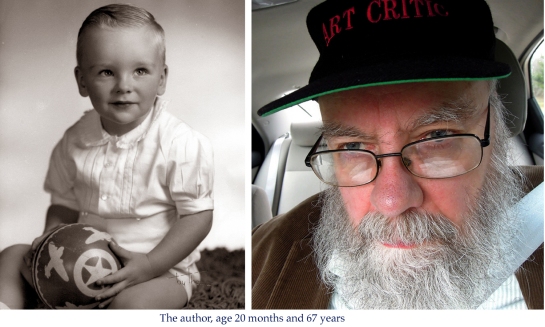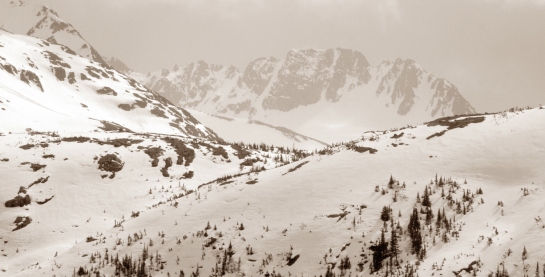 “Don’t make me shoot,” he said. “There’s too much paperwork afterwards.”
“Don’t make me shoot,” he said. “There’s too much paperwork afterwards.”
The guard, Bamki, was only half joking. I call him a guard, but he was more like an administrator. He was the only one left on this hill, surrounded by chain link. He got to live in the quonset hut. There was a coal stove there. We were surrounded by the fence, not so much to keep us in as to mark the edge of the compound; after all, the gate had fallen to ruin long ago, so there really was nothing to keep us in.
From the open front of the garage at the top of the hill, you could see for miles. Nothing out there but grass and scrub, except for the four birch trees under which the quonset hut was pitched. You could drive for hours from here and not find any mark of human activity other than the road, if you can call it that. More like a tractor path.
The five of us were there to fix things. Once a week or so, a truck would arrive. We would drag the load into the garage — more like a barn with a corrugated tin roof — and see what was on offer. A transmission, a desk, an entire load of crowd-control barriers, smashed by some uncontrolled crowd, maybe a sofa or coffeemaker. We never knew, but it was our job to repair and send it out with the next truck.
It was cold. It was always cold. Except in July, when it was hot. Now, it was November and ice glazed the water buckets in the morning. At least we had a brazier in the corner of the garage, although, with one whole wall open to the weather, the only heat was within a few inches of the fire. The tips of the fingers poked through the worn, frayed cloth of our gloves.
“How far do you think it is to Omsk?” Dentril said.
“I don’t know. Maybe 250 miles.”
We didn’t really have a clue. We didn’t really know exactly where we were. No one thought it important to tell us when they dragged us here. What was it. Seven years ago. Maybe eight.
“I think I found a cabbage leaf in my soup,” Dentril said. “No, wait, it is only the cellophane that wrapped the cabbage.” The soup steamed in the corner of the garage on a little propane stove. It was a joke he repeated every day.
Around us were the bones of old tractors, trucks, automobiles and bicycles. A wheel here, a frame there, gathering rust like moss. A crow sits on the fence outside the garage. Now two of them.
Dentril tossed the remains of his soup out the door at them. They didn’t move.
“How far did you say?”
“I don’t really know. Two hundred, three hundred miles. Maybe more.”
“Maybe less?”
“Could be.”
“Which direction?”
“Take your pick.”
“Toward the sunrise, or away from it?”
“What sun?”
The sky was always gray, although it seldom actually rained, or snowed. Winter saw a shadow of snow clumped around the roots of the grasses, where the wind couldn’t sweep it away.
“I mean, are we east or west of Omsk?”
“Or south. And why do you want to know? What difference does it make?”
“I was thinking of going there.”
On the wall, a rack of wrenches lined up, with more empty places than wrenches. Usually, if we couldn’t fix it with a hammer, it just added to the pile of spare parts and wrecks.
Dentril sucked some cold snot back into his nose and wiped the rest on his sleeve.
“I’m thinking Omsk must be nicer than this.”
“I’ve been there,” I said. “It’s OK.”
It was Tuesday, I think. A new truck was coming in. We waited.
“If we go on the truck, we could leave,” he said. “Who’s going to stop us? Bamki? He’s just as stuck here as we are.
“He’s got a gun,” I said.
“So?”
“It’s his job to stop us.”
“And it’s our job to escape.”
He said this as if it reflected some sort of incontrovertible logic. Like the next move in a game of chess, or the changing of tides.
The truck came. It was loaded with boots. Hundreds of them. No laces. They weren’t paired, either. Just a pile of boots. Some had holes in their soles; most looked almost new. They were dumped in the center of the floor. Dentril looked to see if any were his size. He found one, threw out his old shoe and put the newish boot on his left foot, keeping the other shoe on his right.
“What do you think?” he said. “Should we get in the back?”
It was an old army truck, with a canvas cover over its back half and a drop at the back end and a large red star on each cab door. We loaded three re-upholstered sofas on in exchange for the boots. The driver never left the cab. He smoked one cigarette after another without so much as rolling down his window. He didn’t look at us, and seemed mildly annoyed when the loading of sofas made the truck bump.
“I’m going,” Dentril said. “You coming?”
He jumped into the back and ducked behind one of the sofas.
“What you going to eat?” I asked him. “What you going to drink?”
Who knew how long the ride would be. Or where it was actually going, for that matter.
“I’ll eat in Omsk,” he said. That kind of optimism was bred by years of having none at all.
“Come on, don’t be silly,” I said. “Get off.”
“Make me.”
“I would but I don’t want to fill out the paperwork.”
We only had three jokes among us, so we reused them frequently. They were just another set of spare parts.
The driver started up the engine and made a grinding noise with the clutch. I jumped on to pull Dentril back. He crawled deeper into the cargo hold. I went for him just as the truck pulled forward. Dentril grabbed my ankle and held me.
“We’re going. We’re going to Omsk.”
Bamki watched the truck leave through what used to be the gate. He waved at us. He didn’t want to fill out the paperwork.
Two hours later, we were still on the dirt road, going somewhere. I pulled the flaps shut in the back, to try to keep a little warmer.
Three hours later, the same. Six hours the same. Dentril was bored. He reclined on one of the sofas and went to sleep. It began to get dark, and with the flaps closed, we could not see outside. But I could hear that the sound had changed: We were in a town. There were other people. The grinding of the truck echoed off the building faces and made a wholly new soundscape in the darkness.
“Wait till we get to the river,” Dentril said. “Then we’ll jump off.”
We waited, but the soundscape reverted to its former lonesome emptiness. If there had been a river, we missed it.
“Wait till the next town,” Dentril said.
We slept in a jostle of bad truck suspension and bad road.
In the morning, we both peed off the back of the truck.
“Where do you think we are?” Dentril said.
All we could see out the back was more grass. The road was better, paved, even, though full of potholes. By the angle of the sun, I could see we were headed west.
“That’s good,” Dentril said. “That’s toward Omsk, isn’t it?”
“It would be if we knew where we started from.”
He took comfort in that answer, although I don’t know why.
About noon the truck pulled to a stop. We could hear other people outside. They said “sir,” and “yessir,” and it sounded military. This was not good.
After an hour or so, the truck started up again. Dentril said he was hungry.
“I told you,” I said.
“What?”
“That you wouldn’t have any food.”
“Oh, yeah. But I’m hungry.”
We drove another six hours, and entered another populated space. The sound bounced off walls. We slowed. I heard a train pass.
“We should get off now,” I said.
Dentril looked at me, then bolted. He jumped off the back of the truck into what remained of the November sunlight.
“Halt!”
That was the familiar bark of authority. It repeated, more urgently. Then a gunshot and the sound of someone — Dentril — sighing like the air had been squeezed out of him, and a flop on the ground.
The truck took off again. I was alone in the back.
Another night was spent sleeping fitfully on a sofa. Another morning lit up the canvas top of the truck. Another pee out the back. When I looked, the landscape was flat. There was a lake in the distance. A big one. There were geese. The road rounded the shores; nothing else in sight. I was thirsty.
I was hungry, too, but it was the thirst that spoke louder. I damned Dentril for making me take this trip; I prayed for him, too.
As the second night descended, and I was faint from dehydration, the truck came to a stop once more. It was quiet. I peeked out. There was a chain link fence and a gate swung shut.
“Hoy,” said a voice. “Help me get these things out of here.”
He was looking at me. Blank face. No surprise. Like I was supposed to be there.
“Let’s unload,” he said, and turned his back. Another climbed in the back and grabbed one end of the first sofa.
“Let’s go,” he said, looking at me impatiently.
I grabbed my end and we carried the sofa off, into a large warehouse with a tin roof. Went back got the next and then the last, and lined them all up against the inner wall of the building. There were at least 20 other sofas there, all lined up. Beside them were bicycles; on the other wall were transmissions and truck doors. A brazier burned in the corner.
“Cabbage soup again for supper,” he said.
I took the bowl gratefully and slurped down the salty liquid.
“I think I found a cabbage leaf,” I said. “No, it’s only cellophane.”
“Comedian,” he said.























